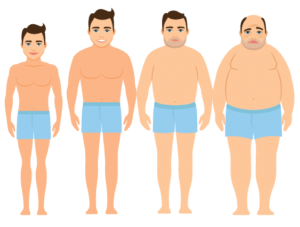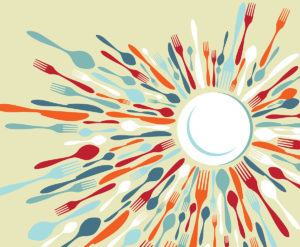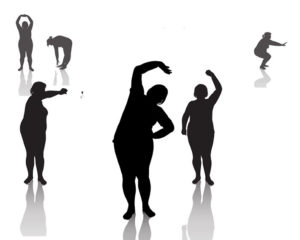Obesity
Weight Gain and Cancer Risk
According to the World Cancer Research Fund, 10 types of cancers are linked with obesity. Researchers from the University of Manchester in the U.K. warn that significant weight gain throughout adulthood ups the risk—by as much as 50% for men and 17% for women—of developing obesity-related cancer.
5 Reasons to Ditch the Diet Mentality
Research suggests intuitive eating may be a promising way to maintain a normal body weight and a healthy relationship with food.
Obesity and Cancer Tie in Survey as Top Health Threat
Americans seem to understand the personal health risks of obesity, but widespread confusion persists about the causes and treatments of the disease, says a new survey from the American Society for Metabolic and Bariatric Surgery (ASMBS) and the independent research organization NORC at the University of Chicago.
Another Way to Prevent Childhood Obesity
Current guidelines say children should get at least 60 minutes of physical activity per day for optimal health and fitness. For many, this is a tall order. Fortunately, exercise doesn’t require an all-or-nothing approach. Recent research has determined that even small amounts of daily high-intensity activity can help kids ward off weight gain.
Improving Health Behaviors
Laura DeFina, MD, FACP, is president and CEO of The Cooper Institute®, as well as its chief science officer. After practicing general internal medicine and geriatrics, she joined The Cooper Institute in 2009 to pursue her interests in prevention and research related to healthy aging. Since then, she has authored manuscripts on, among other topics, brain health, healthy aging, depression, cardiorespiratory fitness and injury in physically active women.
6 Simple Swaps for More Mindful Eating
Replace clients’ mindless eating with mindless eating solutions for everyday life.
Obesity Ups Cancer Risk in Black Men
According to researchers from the Fred Hutchinson Cancer Research Center and the University of Washington, African-American men have the highest rates of prostate cancer (both development and mortality) in the United States. Those same researchers have determined that obesity among this population makes the problem much worse.
The Science of Weight Gain
Fitness professionals expend considerable energy helping people to lose weight, but there’s another way to view this challenge: What are the main factors that cause people to gain weight??
Health Disparities Influenced by ZIP Code
Did you know that where you live may be more important than your family tree in predicting health disparities and health longevity?
Why Weight Loss Programs Don’t Work
The weight loss business generates massive revenue, yet the industry seems to have little effect on waistlines. Recently, researchers took an in-depth look at the efficacy of popular weight loss programs.
Yes, You Can Develop Better Eating Habits
Analogous to laying out your exercise gear so it’s the first visual reminder you have of your commitment to exercise each day, imagine what creating strong visual cues for food might do for your eating habits. Placing a simple, attractive bowl of fruit on the counter instead of stowing the fruit out of sight in a refrigerator drawer could make the difference in your quest to eat “5 a day.”
The Transformative Power of a Single Good Choice
Jonathan Ross has received numerous accolades for his work in the fitness industry, including recognition as the 2010 IDEA Personal Trainer of the Year, the 2006 ACE Personal Trainer of the Year, and the 2003 Personal Training Director of the Year by
PFP
magazine. He possesses a rare combination of fitness knowledge and personal experience with obesity, which he acquired while growing up with nearly “800 pounds of parents.” Ross has served as the fitness expert for Discovery Health and hosted its series
Everyday Fitness.
His book,
Abs Revealed,
Obesity and Cancer Risk Among Women
The link between obesity and a higher risk of developing various forms of cancer has been well drawn. When it comes to women, you may be shocked at how significant that increased risk is.
Cut TV Time, Cut Kids’ Blood Pressure Problems
It turns out that spending countless hours in front of the television or computer poses another threat to children: high blood pressure.
Low Intensity vs. High Intensity: Which Is Best for Obese Adults?
The debate continues regarding the most effective exercise measures for reducing abdominal obesity and improving glucose measures.
Research Looks at the Brain; Diabetes
Two distinct mental strategies used to manage pain—focusing attention externally and re-appraising the pain—involve different brain pathways, according to new research using functional magnetic resonance imaging (fMRI). The study appeared in the journal Anesthesiology (2011, 115 [4], 844–51).
Create Enduring Change
Alison L. Steiber, PhD, RDN, serves as chief science officer at the Academy of Nutrition & Dietetics. She previously served as an associate professor and direc- tor of the coordinated dietetic internship and master’s degree program at Case Western Reserve University, where her research focused on nutritional assess- ment, quality of life, functional status, pancreatitis and probiotics.
Cutting Risk For Obesity-Related Cancers
With excess body fat linked to about one-third of cancers, it makes sense to trim down if necessary. A new study released by New York University suggests that the most protective steps against obesity-related cancers are eating a plant-based diet and limiting alcohol intake.
6 Key Factors That Predict Weight Gain
Fitness professionals expend considerable energy helping people to lose weight, but there’s another way to view this challenge: What are the main factors that cause people to gain weight??
Research shows that two-thirds of Americans are overweight or obese (Ogden et al. 2014), a health condition associated with hypertension, cardiovascular disease, diabetes, depression and various cancers (breast, endometrial, colon and prostate) (Malik, Schultz
&
Exercise and Type 2 Diabetes
Did you know that diabetes affects nearly one-tenth of the U.S. population—a widening epidemic with more than 5,000 new cases per day (ADA 2013)? Type 2 diabetes, formerly called non-insulin-dependent diabetes or adult-onset diabetes, accounts for about 90% of diabetes cases (IDF 2014).



















